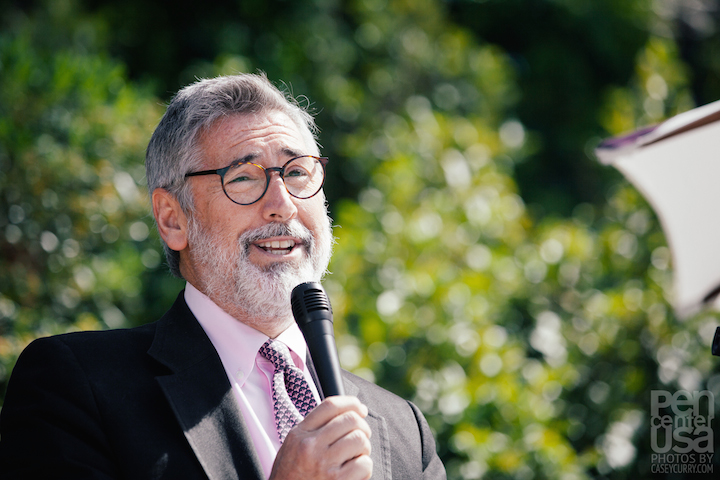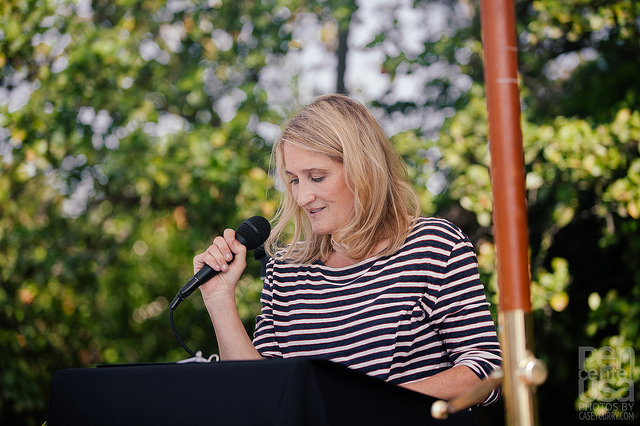Events
TRIGGER WARNINGS & FORBIDDEN FRUIT / PEN / LITERARY STUFF IN LA
I haven’t read the New York Times in a while now. Not since the paywall went up. But yeah, I read that article the other day by Jennifer Medina about college students asking for “trigger warnings” on the books and movies they encounter in class. It’s good that I’m not a professor. I’d get in trouble somehow.
I know about the article because John Landis read it out loud at a PEN Center USA event last Sunday in LA. The event was Forbidden Fruit, PEN’s fundraiser where authors and actors read passages from some of the most banned books of all time. (Lolita, check.) Landis was the emcee. Panio Gianopolous, Maria Bello, Molly Ringwald, Jill Sobule, Frances Fisher, Hill Harper, and others read work from authors like Ken Kesey, Anais Nin, Orwell, Updike, Steinbeck, and Nabokov. All writers whose books might need a trigger warning, I guess.
The trigger warning trend – a hypersensitivity to troubling content that apparently got its start on feminist blogs – feels like the left’s version of the kind of religious let’s-protect-the-children hypervigilance that fuels book-bannings. Cautionary labeling gone out of control rather than explicit censorship, but a similar impulse.
As Landis read the NYT article, there was a lot of head-shaking at the idea of college students asking for warning stickers on their own assigned reading.
The PEN event was cool. I moved to LA four years ago and gradually felt less connected to the “publishing/literary scene” in New York. I wasn’t sure there was a Los Angeles counterpart when I moved out here. But there is. PEN and the LA Review of Books are a major part of it.
And it turns out that the NY to LA migration is slow but steady. Seems like every novelist in NY has a TV pilot in his/her back pocket. Some of them are actually getting made. The cultural conversation is shifting and literature now overlaps with TV.
The event was in the backyard of a gorgeous house in Beverly Hills. It was a this-is-another-world neighborhood. You could hear faint music and happy voices from a pool party somewhere nearby. Between readings, Landis joked that he imagined some kids at the pool party overhearing us and furrowing their brows, asking, “Is that Updike?”
The backyard was crowded. It was a fundraiser and tickets were minimum $150, so it was a mix of wealthy supporters and people (like me) who’d been invited by friends.
Some (or maybe all; I didn’t take inventory) of the 2014 PEN Emerging Voices Fellows were there. I talked to Brandon Jordan Brown, a poet, and Hanne Steen, a novelist. I had seen them read a few weeks earlier with the other fellows. It was one of the better readings I’ve seen in a while.
PEN has some powerful benefactors but struggled financially in the last few years, especially after the 2008 financial collapse. They spend money to promote freedom of speech around the world and advocate for imprisoned writers and journalists, so it’s worth joining if you can afford it.
The Forbidden Fruit reading wasn’t short. There were a lot of readers and it was sunny and you got a little drowsy, in a good way. My friend Zelda was there and I couldn’t tell if her eyes were closed behind sunglasses. I nudged her foot and she didn’t move but murmured, “I like being read to.”
They were all good but my favorite readings were Hill Harper reading from Of Mice and Men and (I think; I have an uneasy sense that my memory is fucking with me here) Jill Sobule reading from The Catcher in the Rye, which isn’t even a book I love that much, but she was a really good reader.
Afterward as we were walking out, a woman looked around and said, “I wonder which house was having the pool party.” I said, “I’m not sure.” She hesitated a moment, then pointed at a massive hedge nearby and said gravely, “That’s Rupert Murdoch’s house. Or at least it used to be.”








If you’re sure that trigger warnings are condescending or destructive, this brief essay might successfully complicate that commitment.
If I read at an event like that PEN shindig, I’d read either Ballard’s first romantic interlude in Child of God or the peep-show bust-up in The Hamlet.
I can’t really put my finger on why trigger warnings piss people off. Simple ignorance, I guess: people not understanding (or caring about) the psychological/emotional reality of being a survivor of sexual abuse. Just another way for people to marginalize those whose pain means nothing to them…
Great link!
I’m not sure why it’s always sexual abuse that is the trigger warning example. From my understanding, it’s about all trauma, right?
What about a trigger warnings for murder? Suicide? Physical Abuse? What about a trigger warnings for the tragic early death of a loved one? Are those things not terrible to experience and be reminded of as well?
There isn’t only one kind of lingering emotional pain people experience, and that’s what makes trigger warnings seem extreme. There’s no reasonable way to capture every pain people may feel, to the exact degree that they feel it, and then slap a written explanation of that pain on the cover of a given book. And even further, I see no reasonable way to do that without, in some way, marginalizing the emotional content of the book itself, presumably written by an author who may have also felt that kind of pain.
Your assertion that trigger warnings are only brushed-off by people who have not experienced pain, or those that cannot empathize with pain is wrong. Many people, myself included, have experienced many kinds of emotional trauma and physical pain in our lives, have nothing but empathy and love for victims of terrible shit, and still see some sort of standardized trigger warning system as a ridiculous extreme.
there is nothing standard about trigger warnings, and anyone can choose to use a trigger warning for any form of traumatic content. they are voluntary gestures that are considered to be courteous acts of respect. don’t use them if you don’t want to. after all, no warning will ever convince your audience that your review, essay, talk, etc. is worth the pain.
in reality, no author or magazine is marginalized by offended readers.
I’m not sure of that at all. I do think it’s complicated. I tend to agree with Gene’s comment, but I also think that if I were a professor showing a film like Salo or assigning a book like Hogg (which I wouldn’t, I’m just picking the most extreme example of stomach-turning literature; but let’s say I did), I’d be inclined to say something to the effect of, “Just in case anyone’s not aware, this movie contains some pretty extreme violent/sexual imagery, so if you don’t feel like you can watch it comfortably, let’s meet and discuss some alternatives.” That said, I tend to think “trigger warnings” on canonical, *relatively* tame stuff like The Great Gatsby (??) and Lolita are a little silly.
*trigger warnings* for art/literature/film etc, to me, are akin to *spoiler alerts*
for example, if a book i’m about to read has a *trigger warning* for suicide, well, to me, that’s a *spoiler*
perhaps there need to be OPTIONAL *trigger warning* labels or something (categorized by trigger type??) available for those who want the warning
perhaps students who know they need *trigger warnings* should be allowed to confer privately with a professor/advisor and make adjustments – seems reasonable
by definition, students are people who do not already know anything
To be clear, I’m not saying that professors shouldn’t warn students when there is emotionally difficult content ahead, that seems like common courtesy.
“Should I have trigger warninging’d @Klassnik ‘s reading? Wait. Should I have trigger warninging’d trigger warning @Klassnik ‘s reading?” (@mm_shea … Michael Martin Shea)
(regarding my reading in Oxford, MS)
perhaps individuals who know they need *trigger warnings* should be allowed to confer privately with a professor/advisor and make adjustments, if they’re taking a class
better?
lol yeah, i had thought to myself “i need a *trigger warning* warning”
but then i’m pretty sure there’s gonna be some kind of *trigger*
and i’m not sure i want to know that
speaking strictly personally
You raise a good point: there are so many forms of trauma. Having said that…I am not sure that the death of a loved one can necessarily be compared to sexual abuse. I have seen people re-traumatized over the sexual abuse they have survived and it was… I can’t even put a word on it. I’ve never seen someone react that way when reminded about the death of a loved one. Of course, this is just my experience.
It’s a very difficult subject. I still haven’t made up my mind about it.
what real purpose would that serve?
i agree. the biological impact of history cannot be conflated with the experience of human limitation.
I should say, I didn’t mean ‘you, Nick’, but rather, ‘you! hypocrite lecteur!—mon semblable,—ma sœur et mon frère!’.
My feelings, too, are strongly mixed. My first impulse is to ridicule: art is for disturbance–if you’re not upset by Oedipus or Lear or Huck Finn or Persona, then you’re a callous asshole. There’s great stuff that’s so intellectualized that there’s no psychic minefield in it, like, say, Wallace Stevens, but most great literature is painful – and that’s good.
Gatsby‘s a useful example of overreach: Tom slaps Myrtle and breaks her nose, which treatment she accepts, and later, she’s run over by a car and her husband, in mistaken revenge, shoots another character and then himself. That’s the extent of “gore” in the novel, and written as unspectacularly as that. A reader who’ll be traumatized by Gatsby won’t be able to take a history class with any warfare in it. A chemistry professor won’t be able to tell them the consequences of misusing the equipment.
But the point made in Howard’s blogicle is persuasive to me: better to sin against literature by giving scamsters an excuse not to read a book than to sin against an unusually vulnerable person by springing something horrendous on them.
I think you’re right: it’s not especially difficult to have teachers calmly warn students about rough, hurtful stuff and, in cases of PTSD, have alternative assignments.
I think it’s the harsh dogmatism of trigger-warning requirements that’s gotten people impatiently against the warnings themselves, but the genuine utility of warning students about (re)traumatization doesn’t need to be lost in resisting pseudo-protective fanaticism.
As I understand things, the PTSD that trigger warnings are meant to anticipate and ameliorate is a mechanism that emerges in survival of violence in general, of which sexual violence is a subset. It may be that the process of warning an unusually vulnerable audience arose in the context of misogynistic violence, but institutions like UCSB and Oberlin have broadened the thing to include mistreatment categorically. –however rationally or foolishly at any particular place!
Trigger warnings are not censorship. Trigger warnings are not “let’s protect the children by banning books.” Trigger warnings are not the PC-police gone wrong. It’s simplistic, reductive and plainly false to suggest trigger warnings are any of those things. I guess those with no ability to think critically and also empathize with others might say trigger warnings are censorship. I guess if you’re not capable of compassionate understanding regarding sexual trauma, you might get all righteous and feel the need to mansplain trigger warnings so us delicate womenfolk can understand we really don’t “need” them.
Trigger warnings don’t mean that the books with rape in them don’t get read. (To suggest they do is just ignorant. Sorry.) Trigger warnings don’t make any statements or judgment about the literary quality of a work. Trigger warnings don’t mean books with difficult subjects won’t be on the syllabus; in fact, trigger warnings make it more likely the difficult books will be assigned, because professors can stop worrying they’ll lose a student when the student is traumatized by the material.
If one in five women must suffer the trauma of a sexual assault in this deeply misogynist culture of ours, is it really too much to ask that re-traumatizing books and other materials be identified? Seriously? That’s too much to ask? Are we that uncaring, that selfish?
I was raped when I was 20. For almost 20 years after, I could not even speak the word “rape” out loud. Seeing a news story on the TV about sexual assault plunged me into an attack of anxiety, panic and depression that would last for days. To say I had PTSD understates the severity of the flashbacks and the panic attacks that plagued me.
Although now I appreciate and even sometimes seek out books and movies with rape scenes, there were years that I could not. And, yes, my performance as a student suffered for it. A little warning — which would have signaled compassion and acknowledgement — would have been nice.
HTMLGIANT, do you realize how often you alienate women? Do you know that if you google “HTMLGIANT,” the first autocomplete is “sexism?” So, um, thanks for mansplaining trigger warnings from your position of ignorant male privilege. I’m a writer and I’m a woman. I never read you. None of my women writer friends read you. And this little bullshit weak-link opinion about how trigger warnings equal censorship is a perfect example of WHY. So, seriously: thanks for revealing yourselves to be exactly what google says you are.
What’s simplistic, reductive and plainly false is to suggest that people who have an issue with trigger warnings are somehow trying to “mansplain” and have no ability to empathize.
This kind of thinking and attitude is what keeps a discussion like this from moving forward. If you have an opinion, please share, but also please respect our ability to have a rational conversation.
For example, if trigger warnings are purely about sexual abuse, then why implement them for every kind of trauma? Why implement them at all if it’s a single issue that’s their reason for existence? Why, for example, don’t colleges devote more energy and resources to directly helping victims of sexual abuse instead? It is a serious issue, and it deserves serious discussion.
There are a lot of good questions that can come from talking about this, and none of them get asked by trolling everyone who has doubts about trigger warnings and calling them ignorant misogynists. This kind of flame-bait is unacceptable for my venue, and I will ban it going forward.
Pretty sure “what keeps a discussion like this from moving forward” is banning comments like pixie’s
you see, the safe thing would be to troll about how spencer madsen owes you $4.
I don’t think so.
My feelings about her comment have nothing to do with the point she wants to make. Trolling is not acceptable, and calling everyone who has issues with trigger warnings a misogynist is trolling.
i agree with gene that “What’s simplistic, reductive and plainly false is to suggest that all people who have an issue with trigger warnings are somehow trying to “mansplain” and have no ability to empathize.”
imo, and speaking strictly personally, “what keeps a discussion like this from moving forward” are blanket/inflammatory terms like:
1. “those with no ability to think critically and also empathize with others…”
2. “I guess if you’re not capable of compassionate understanding regarding sexual trauma…”
3. “…you might get all righteous and feel the need to mansplain trigger warnings so us delicate womenfolk can understand we really don’t “need” them.”
just to get all specific and list-y, as is my wont
4. “So, um, thanks for mansplaining trigger warnings from your position of ignorant male privilege.”
Nope. I haven’t had to moderate at all.
And I definitely don’t want to pile-on pixie. I actually enjoy reading different, well made arguments. Especially in the case of something like trigger warnings, which I have no deeply formed opinion on.
I have no doubt that there are good arguments in all directions, and that pixie could add to the discussion.
Passionately believing in something is a wonderful thing. I just don’t like to see it get ugly, like the examples you’ve singled out, mimi.
I’m usually “pro-expression” but I believe there’s a very real need for trigger warnings. But we should be thoughtful about how we implement such policies.
Here’s what I mean: I began teaching during a transitional period in the 90s, when educators were becoming more aware of and sensitive to “learning differences.” While most schools acknowledged that these were legit concerns (not simply a matter of students needing to “apply themselves”) few of them had policies in place regarding identifying said differences, or how accommodate them.
You can imagine the result: any student could self-identify as dyslexic etc, and you had to take them at their word. Many students received the assistance they needed; a few abused the good faith of teachers. And of course teachers were equally erratic in how they dealt with the situation–some ignored the requests completely; some gave the students “A”s simply for showing up.
Now the situation is much better: each student with learning differences must be officially tested and diagnosed; they then “declare” their issues to the school; and before the school year starts, teachers receive a letter for each student, specifying what accommodations must be made. This system also helps ensure that students are getting help both in and out of the classroom.
I’d argue that something similar must be done with regard to trigger warnings: the student must be diagnosed—PTSD, anxiety disorder, etc—and the teacher forewarned before the school year/semester starts, and given specific instructions on how to deal with each student’s needs. This would minimize the “they’re just being too sensitive” allegations, and provide the instructors with some much-needed guidance.